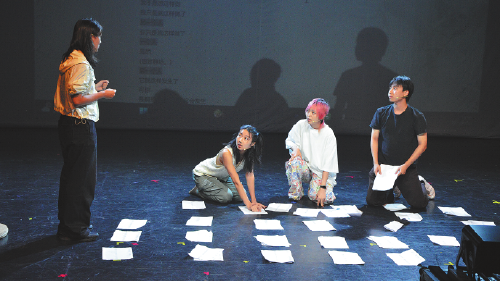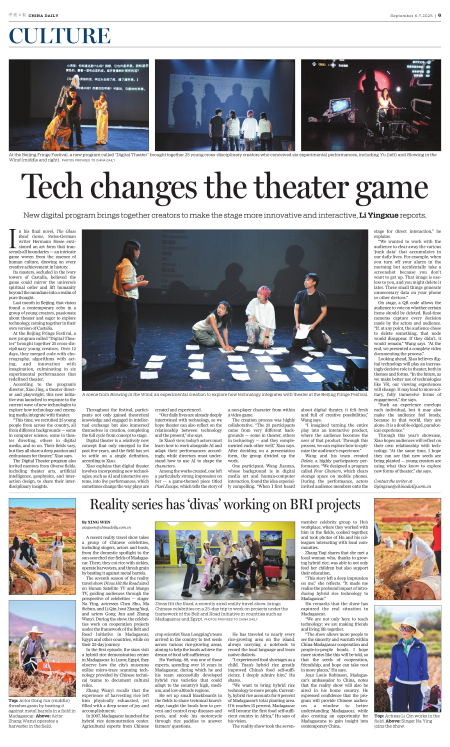
At the Beijing Fringe Festival, a new program called "Digital Theater" brought together 25 young cross-disciplinary creators who conceived six experimental performances, including Yu (left) and Blowing in the Wind (middle and right).

A scene from Blowing in the Wind, an experimental creation to explore how technology integrates with theater at the Beijing Fringe Festival.
In his final novel, The Glass Bead Game, Swiss-German writer Hermann Hesse envisioned an art form that transcends all boundaries — an intricate game woven from the essence of human culture, drawing on every creative achievement in history.
Its masters, secluded in the ivory towers of Castalia, believed the game could mirror the universe's spiritual order and lift humanity beyond the mundane into a realm of pure thought.
Last month in Beijing, that vision found a contemporary echo in a group of young creators, passionate about theater and eager to explore technology, coming together in their own version of Castalia.
At the Beijing Fringe Festival, a new program called "Digital Theater" brought together 25 cross-disciplinary young creators. Over 12 days, they merged code with choreography, algorithms with acting, and innovation with imagination, culminating in six experimental performances that redefined theater.
According to the program's director, Xiao Jing, a theater director and playwright, this new initiative was launched in response to the current wave of new technologies to explore how technology and emerging media integrate with theater.
"This time, we recruited 25 young people from across the country, all from different backgrounds — some in computer science, some in theater directing, others in digital media, and so on. Their fields vary, but they all share a deep passion and enthusiasm for theater," Xiao says.
The Digital Theater program also invited mentors from diverse fields, including theater arts, artificial intelligence, geophysics, and interaction design, to share their interdisciplinary insights.
Throughout the festival, participants not only gained theoretical knowledge and engaged in intellectual exchange but also immersed themselves in creation, completing the full cycle from concept to stage.
Digital theater is a relatively new concept that only emerged in the past few years, and the field has yet to settle on a single definition, according to Xiao.
Xiao explains that digital theater involves incorporating new technologies, such as AI and interactive systems, into live performances, which sometimes change the way plays are created and experienced.
"Our daily lives are already deeply intertwined with technology, so we hope theater can also reflect on the relationship between technology and the present," she says.
In Xiao's view, today's actors must learn how to work alongside AI and adapt their performances accordingly, while directors must understand how to use AI to shape the characters.
Among the works created, one left a particularly strong impression on her — a game-themed piece titled Pixel Escape, which tells the story of a non-player character from within a video game.
The creation process was highly collaborative. "The 25 participants came from very different backgrounds — some in theater, others in technology — and they complemented each other well," Xiao says. After deciding on a presentation form, the group divided up the work.
One participant, Wang Jiaxuan, whose background is in digital media art and human-computer interaction, found the idea especially compelling. "When I first heard about digital theater, it felt fresh and full of creative possibilities," Wang says.
"I imagined turning the entire play into an interactive product, where the audience becomes the user of that product. Through this process, we can explore how to optimize the audience's experience."
Wang and his team created Delete, a highly participatory performance. "We designed a program called Four Cleaners, which clears storage space on mobile phones. During the performance, actors invited audience members onto the stage for direct interaction," he explains.
"We wanted to work with the audience to clear away the various 'junk data' that accumulates in our daily lives. For example, when you turn off your alarm in the morning but accidentally take a screenshot because you don't want to get up. That image is useless to you, and you might delete it later. These small things generate unnecessary data on your phone or other devices."
On stage, a QR code allows the audience to vote on whether certain items should be deleted. Real-time cameras capture every decision made by the actors and audience. "If, at any point, the audience chose to delete something, that node would disappear. If they didn't, it would remain," Wang says. "At the end, we presented a complete video documenting the process."
Looking ahead, Xiao believes digital technology will play an increasingly decisive role in theater, both in themes and forms. "In the future, as we make better use of technologies like VR, our viewing experiences will change. It may lead to more solitary, fully immersive forms of engagement," she says.
"Such an experience envelops each individual, but it may also make the audience feel lonely, because in that world, they are alone. It is a double-edged, paradoxical experience."
Through this year's showcase, Xiao hopes audiences will reflect on their own relationship with technology. "At the same time, I hope they can see that new seeds are being planted — young creators are using what they know to explore new forms of theater," she says.
Contact the writer at liyingxue@chinadaily.com.cn

